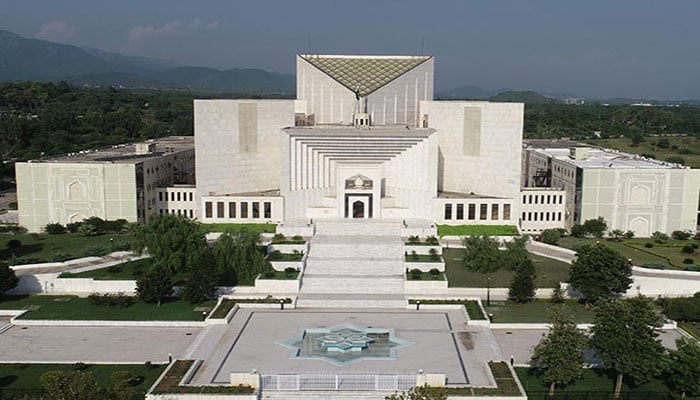Judges start saying ‘no’ to govt plots
ISLAMABAD: At least three Supreme Court judges -- Justice Qazi Faez Isa, Justice Syed Mansoor Ali Shah and Justice Yahya Afridi – as well as all the judges of the Islamabad High Court IHC did not get even a single residential plot in Islamabad from the federal government.
Under the policy, which has now been questioned by even superior court judges, a Supreme Court judge is entitled under a policy made during the Musharraf era to get two residential plots in Islamabad whereas a high court judge is given one plot.
The allotment of plots to judges is not part of their terms and conditions as reflected in the Presidential Order, which under the Constitution determines their pay, pensions, perks etc.
The allotment of plots to judges, generals, secretaries, journalists, media owners etc has been a controversial issue in the past too. The issue has now come under renewed focus following some recent decisions of the IHC. Allotment of government lands to influential segments of society has never been backed by any act of parliament but through the executive’s policies allegedly made under pressure.
IHC CJ Justice Athar Minallah recently suspended the allotment of plots to judges and bureaucrats and referred the matter to the government for a reconsideration of the policy. On Tuesday, the federal cabinet considered the matter and, while agreeing with the decision of the IHC, set up a committee to review the policy.
The Federal Government Employees Housing Foundation (FGEHF) recently allotted plots through balloting to the judges of the high court and district courts, judges of the Supreme Court and bureaucrats. In a case, SC Judge Qazi Faez Isa observed that neither the Constitution nor any law entitled judges or senior members of the armed forces to receive plots or pieces of land.
In his note in a judgment relating to CDA matters, Justice Isa referred to the sizeable monthly pension received by retired judges of the superior judiciary and said, “The annual cost of pension payments is almost equal to the cost of the ‘running of the civil government’, which is 476,589,000,000 rupees (four hundred and seventy-six billion, five hundred and eighty-nine million rupees).
The people of Pakistan pay these pensions despite having very little themselves. To serve the nation is a singular honour. When, in addition to receiving pensions, public lands (allotted to judges) are taken it is eminently unfair.”
Former CJP Jawwad S Khawaja had also refused to get any plot from the government while his colleagues got two each. In 2017, the revered former CJP had told The News that the policy of allotment of residential plots to a selected few influential groups is unfair and unjust but in case of judges of the superior judiciary, it is not in accordance with their code of conduct.
He had said that the government can’t have such policy where state resources are bestowed upon a selected few influential members of society. “In the case of judges of the superior judiciary, accepting the offer of allotment of even a single plot, in my view, is a violation of the judges’ code of conduct,” he said, adding that the judges could not accept anything beyond what is offered to them under the Presidential Order (pension, salary and privileges).
“It’s like favouring the judges,” Khawaja had said, explaining that how could judges accept a plot from the government against whom they have to hear cases every day. The retired Justice referred to “Article VIII” of the Code of Conduct for Judges, to state that in his opinion accepting any favour by a judge from anyone violates the Article as well as the oath of the judges. The Article reads: “”Gifts are to be received only from near relatives and close friends, and only such as are customary. Everything in the way of favours in consequence of the office must be refused. In accepting any entertainment offered, whether general or particular, care should be taken that its real purpose does not conflict with a judge’s duty to maintain detachment from likely litigants, and from partisan activity.”
-
 Prince Harry Secretly Reaches Out To King Charles, William Amid Andrew Scandal?
Prince Harry Secretly Reaches Out To King Charles, William Amid Andrew Scandal? -
 Bruce Campbell Makes Heartbreaking Statement As He Releases Details Of Cancer Diagnosis
Bruce Campbell Makes Heartbreaking Statement As He Releases Details Of Cancer Diagnosis -
 Kaley Cuoco Reveals How She Felt On The Set Of 'Charmed'
Kaley Cuoco Reveals How She Felt On The Set Of 'Charmed' -
 ‘Mouse Utopia’ Collapse Shows The Need For Space Colonies, Says Elon Musk
‘Mouse Utopia’ Collapse Shows The Need For Space Colonies, Says Elon Musk -
 Kate Middleton Sends Powerful Message To King Charles Amid Olive Branch To Meghan Markle, Harry
Kate Middleton Sends Powerful Message To King Charles Amid Olive Branch To Meghan Markle, Harry -
 Prince Harry, Meghan Markle Mark Major Milestone With Powerful Message
Prince Harry, Meghan Markle Mark Major Milestone With Powerful Message -
 'Emmerdale' Actor Eric Allan Breathes His Last After Incredible 48-year Career
'Emmerdale' Actor Eric Allan Breathes His Last After Incredible 48-year Career -
 Prince William 'already King Unofficially' Amid Charles Abdication Plans
Prince William 'already King Unofficially' Amid Charles Abdication Plans -
 FBI Hunts For Another High-profile Missing Case After Nancy Guthrie Disappearance
FBI Hunts For Another High-profile Missing Case After Nancy Guthrie Disappearance -
 Carrie Underwood Unleashes Fierce Response After Unfortunate Incident On 'American Idol'
Carrie Underwood Unleashes Fierce Response After Unfortunate Incident On 'American Idol' -
 Meta Tests AI Shopping Feature To Compete With ChatGPT And Gemini
Meta Tests AI Shopping Feature To Compete With ChatGPT And Gemini -
 Prince Harry’s Claims About Prince William Fight Get Exposed: ‘The Truth Is Different’
Prince Harry’s Claims About Prince William Fight Get Exposed: ‘The Truth Is Different’ -
 Savannah Guthrie Continues To Receive Support From Meghan Markle's Close Friend
Savannah Guthrie Continues To Receive Support From Meghan Markle's Close Friend -
 Alan Cumming's Unexpected Gesture Comes To Light As He Blasts BAFTA For Tourette’s Incident
Alan Cumming's Unexpected Gesture Comes To Light As He Blasts BAFTA For Tourette’s Incident -
 Global Oil, Gas Shipping Costs Soar As Iran Warns Of Strait Of Hormuz Closure
Global Oil, Gas Shipping Costs Soar As Iran Warns Of Strait Of Hormuz Closure -
 Beyond The Smartphones: Qualcomm CEO Sees Robotics As Top Growth Engine By 2028
Beyond The Smartphones: Qualcomm CEO Sees Robotics As Top Growth Engine By 2028




